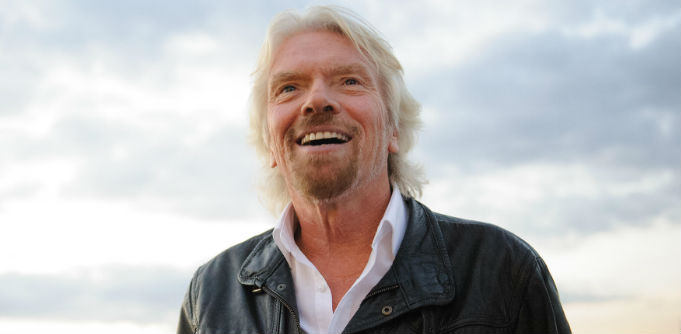
Virgin Group founder Richard Branson.
Harvard Business School strategy guru Professor Michael Porter famously described the airline industry as “one of the least profitable industries known to man”. He said most airlines are predominantly losing money, “punctuated by brief periods of mediocre profits”.
Virgin Atlantic’s profits have not always been mediocre, but it has certainly often lost money, achieving an operating profit only twice in the 2010s. Predominantly long-haul, it has faced intense competition over the years, with British Airways controlling more landing slots at Heathrow — especially on the profitable routes across the Atlantic.
In the calendar year 2019, Virgin Atlantic turned over almost £3 billion ($5.6 billion), made a pre-tax loss before exceptional items of £30 million, and employed some 10,000 people. Thanks to COVID, the airline in 2020 lost £669 million before tax and exceptional items on turnover of £0.9 billion, and staff numbers were cut to just below 6,000.
Besides this huge reduction in staff, Virgin Atlantic has needed over £1.5 billion from rescue deals and sell-offs to stay airborne during the pandemic. This has included hundreds of millions of pounds from Richard Branson’s Virgin Group, which owns 51% of the business. US airline Delta, which owns the remaining 49%, contributed too.
Virgin Atlantic has been in private hands for the whole of its 37-year existence. But now, fresh from his trip to the edge of space, Branson is reputedly planning to list the airline on the London Stock Exchange this autumn. This IPO has come as something of a surprise — but is it really?
What’s wrong with the airline business?
Why did Porter consider airlines so unprofitable? It goes back to his well-known “five forces” analysis, which includes the barriers to entry into an industry for potential competitors, the level of competition and the ability of suppliers and customers to extract money.
Anyone with enough money can enter the airlines industry as planes, crews and landing gates can all be hired. An entrant can start with as little as one plane if they so wish. This means there is always the potential for lots of new players, which forces operators to be as competitive as possible — usually meaning the cheapest possible tickets for customers.
At the same time, suppliers have immense power to extract profits from airlines. Popular hub airports such as Heathrow can charge them handsomely for using their landing slots. Equally, when airlines buy large planes they must face the duopoly of Boeing and Airbus, neither of which is likely to offer a bargain given the lack of competition. In addition, the industry is unionised and the unions can bring flights to a halt. This all serves to squeeze airlines’ profits.
Even then, airlines are very much at the whim of what strategists would call environmental forces. Over the years there have been major collapses in demand and air travel following 9/11, the global financial crisis of 2007-09, and now COVID.
Yet despite persistently low profits and the history of collapses of well-known names, including Monarch and FlyBMI, new entrants continue to appear, such as Norway’s Flyr. Decade after decade, it is an industry which some view as “sexy”.
Explaining the IPO
Branson himself was presumably drawn by airline glamour when he launched Virgin Atlantic in 1984, but nearly four decades of competing in this tough industry and the sheer size of the pandemic losses might have forced a rethink. Floating the business and presumably reducing his exposure to the enormous risks must look attractive right now.
He may also be under pressure on the back of the airline’s rescue. As well as the assistance from Virgin Group and Delta, Virgin Atlantic’s August 2020 bailout involved £170 million in loans from New York hedge fund Davidson Kempner Capital Management.
Hedge funds charge high prices for rescues and this will have been no exception — especially if Virgin Atlantic had little choice after the UK government refused to bail it out in summer 2020. The IPO may well have been part of the agreement with Davidson Kempner, allowing the hedge fund to exit in a timely manner.
The question now is how tempting a flotation will be for investors. The first thing to stress is that Virgin Atlantic’s future will not necessarily be a continuation of its previous performance. A major crisis usually provides opportunities for management to restructure a business and cut costs — and COVID has been no exception here.
Virgin Atlantic emerges with that much reduced workforce, has retired several old inefficient planes, and has closed all its interests at Gatwick Airport near the UK’s south coast to leave only London Heathrow and Manchester as its UK hubs. The logic behind getting out of Gatwick is that the airline likely had overcapacity on long haul from the UK’s south east, and Heathrow is far more popular with travellers. The airline may well now be more efficient, retaining its most profitable routes and aircraft.
There has also been an enormous appetite for new stock market listings, with a record £27 billion raised including 49 IPOs in London in the first six months of 2021. This is doubtless a “bubble” and valuations are strained at best. But borrowing costs remain low and cash generates little if any interest, so there is lots of money seeking better returns, and every chance that this continues for the foreseeable future. An influx of small amateur traders using apps such as Robinhood and eToro is also helping raise demand for shares.
In this market, there may be much interest in a well-known brand such as Virgin Atlantic that may be more efficient than before COVID. Following the lifting of quarantine requirements between the EU, US and the UK, flight bookings on transatlantic routes have reportedly surged in recent days, albeit from a low base.
Against all that are several important caveats. Business travel, which is so important for airline profits, may not fully recover as organisations have become used to video conferencing. Concerns for the environment have grown over the past 18 months, which again may mean reduced demand for air travel. And add to that everything that Porter says about this business in general.
But if Branson can persuade investors that the pros outweigh the cons, it could yet be that the time has never been better for an airline IPO. As always, timing is key in flotations. After a terrible pandemic, Virgin Atlantic may yet emerge in a better position than it went in.![]()
This article is republished from The Conversation under a Creative Commons license. Read the original article.
Handpicked for you

Richard Branson says Australia’s slow vaccine rollout hurts all businesses — these startups agree



COMMENTS
SmartCompany is committed to hosting lively discussions. Help us keep the conversation useful, interesting and welcoming. We aim to publish comments quickly in the interest of promoting robust conversation, but we’re a small team and we deploy filters to protect against legal risk. Occasionally your comment may be held up while it is being reviewed, but we’re working as fast as we can to keep the conversation rolling.
The SmartCompany comment section is members-only content. Please subscribe to leave a comment.
The SmartCompany comment section is members-only content. Please login to leave a comment.